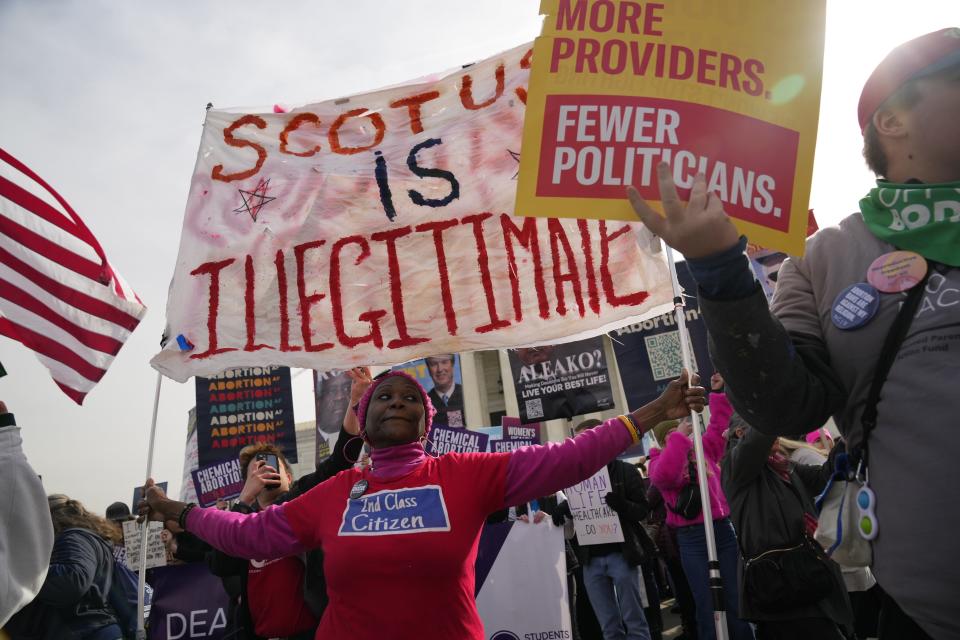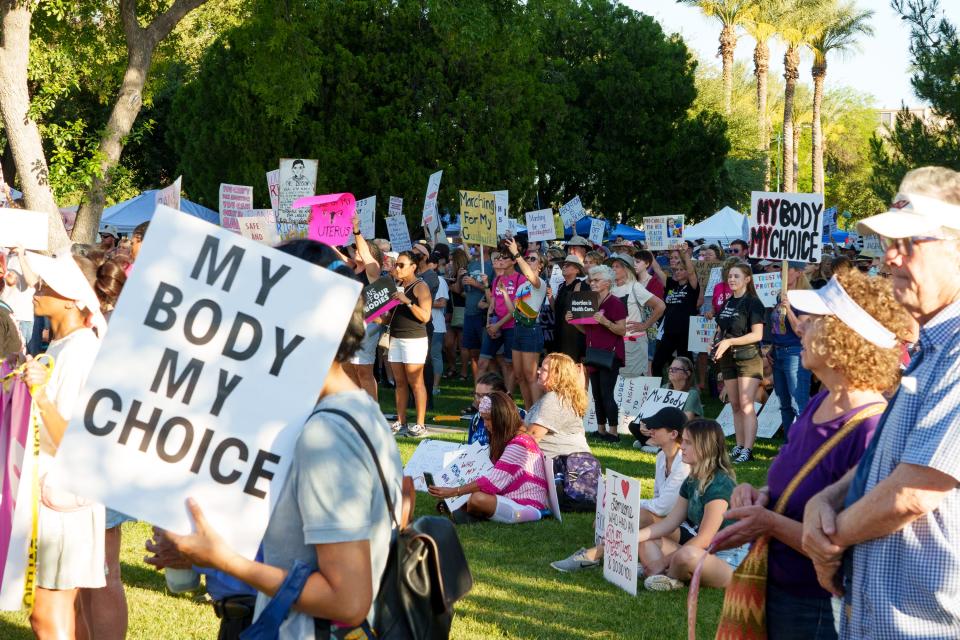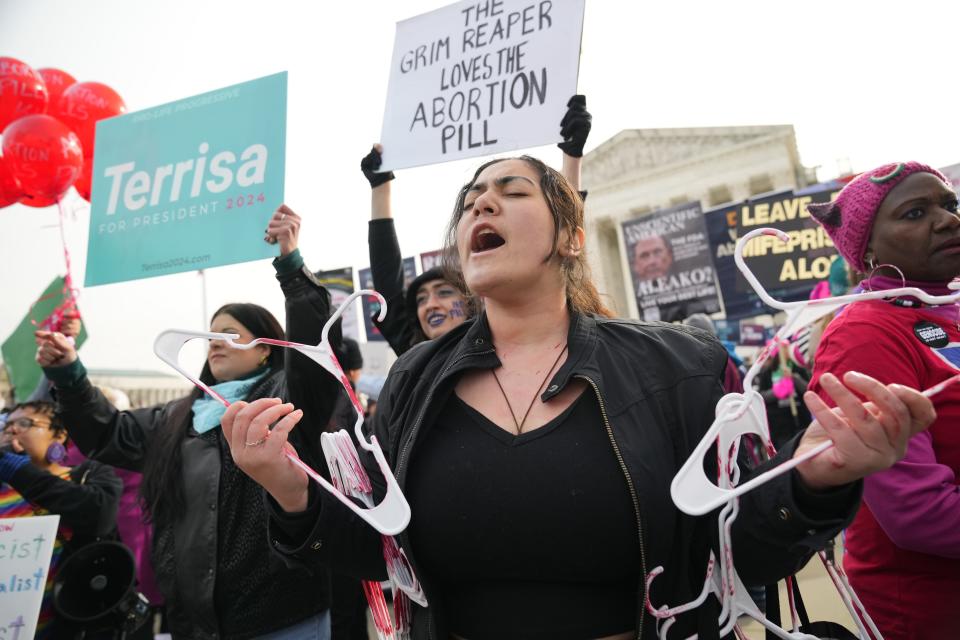Will abortion advocates continue their winning streak? Here's which states will be key.
Activists battling to protect abortion rights have found their arena of choice: the voting booth.
Since the U.S. Supreme Court overturned Roe v. Wade in 2022, reversing the landmark case that guaranteed the right to an abortion on the national level, abortion rights have been largely debated and decided on a state level.
And while several states across the country have restricted or banned the procedure, advocates trying to expand abortion access have still been successful, passing state constitutional amendments to enshrine abortion access even in places like ruby red Ohio and conservative Kansas.
This year, citizen initiatives to put abortion rights on the ballot are ongoing in at least a dozen states, including Florida and Arizona, and could put the issue in front of millions of voters come November.
A victory for reproductive rights: Democratic candidate Marilyn Lands wins Alabama special election
These initiatives may also carry implications for races up and down the ballot. Democrats are looking for an electoral boost from the debate, similar to the victories the party racked up in the 2022 midterms after campaigning on abortion rights.
Here’s the latest on the efforts and what both sides are saying about the possible amendments.

Florida efforts near finish line
Florida voters could know by the end of this week whether they will see a question on abortion rights on their ballot this fall.
The state’s Supreme Court heard arguments early February against the proposed amendment, which would guarantee abortion access in Florida through viability – typically 24 weeks of pregnancy and previously the federal standard set by Roe v. Wade.
Abortion back at SCOTUS: How the Supreme Court case on the abortion drug mifepristone could affect 2024 election
The court has until Monday, April 1, to issue a ruling. Anna Hochkammer, executive director of Florida Women’s Freedom Coalition, one of many groups behind the state’s abortion initiative, said she expects a decision to either come down Thursday morning – when the court typically publishes their decisions – or for the clock to run out and effectively put the amendment on the ballot after all.
“This is D-Day,” Hochkammer said. “I mean this is what we started working for on June 1 last year. And it's the last step to get to the top of Mount Everest.”
Currently, abortion is legal in Florida up to 15 weeks and could drop to 6 weeks, once a new state law goes into effect.
The initiative’s success so far reflects Floridians’ more "middle of the road” views on the issue, Hochkammer said.
“I think a lot of people out there thought that Florida wasn't going to make it ... And we ended up lapping the field,” she said.
Needing just under 900,000 petition signatures, the group ultimately collected almost a million.
Arizona advocates on track to get a vote
Arizona proponents are also looking to enshrine abortion access to the point of viability in their state constitution.

Arizona for Abortion Access, the group behind the initiative, is still in the process of collecting signatures but say they are on track to make their early July deadline. The petition needs just under 400,000 signatures, and as of their latest update in mid-January, supporters had already gathered 250,000.
The group is aiming to collect double that requirement, though, as “padding” for anticipated challenges, said Dawn Penich, communications director for the ballot initiative.
“There will absolutely be lawsuits, there always are,” Penich said. “So we've been prepared for that all along. And it's not a worry.”
The lawsuits are expected to begin, Penich said, once signatures are done being collected and the petition then goes through a statewide validation process. Opponents will likely target allegations from the legitimacy of the signatures to the methods by which they were collected, she said.

Can abortion advocates continue a "long line" of victories?
Proponents in both Florida and Arizona told USA TODAY they’re confident going into November.
And they have precedent to back that – constitutional amendments for abortion access have won handily in every state they have appeared in so far.
“People simply don't have a lot of tolerance for government meddling around inside their doctor's offices and inside their emergency rooms,” Hochkammer of Florida said.
Flipping seats in 2024: This Democratic group is taking the fight over abortion rights to state legislatures
In Arizona, Penich said she expects her state to join the “long line of abortion access wins.”
“Here in Arizona, we have an ethos that crosses party lines, about doing what's right for yourself, politicians not having too much say over what you get to do,” she said.

That mentality extends to independents and Republicans in the state, as well, Penich said, something she witnessed firsthand while collecting signatures at a public event.
"One gentleman came over to the volunteer with the clipboard and said, 'You know, I don't agree with abortion, but I don't like the government telling me what to do with my guns, I don't like the government telling me what shots to put in my body, and the government shouldn't be telling you ladies what to do, either.' And that's just like such an Arizona conversation,” she said.
But opposition groups in Arizona are hoping to break that national win streak and told USA TODAY theirs is the state to do that.
“Arizona is not Ohio. Arizonans can think for themselves,” said Olivia Escobedo, political director and spokeswoman for It Goes Too Far, an organization dedicated to defeating this proposed amendment.

Escobedo was referencing an amendment to the Ohio constitution enshrining abortion through viability, which voters there passed last November by double digits.
She argues that a similar proposal goes beyond what most Arizonans want.
“The majority of voters do not support what this amendment is. They support significant limits on abortion,” Escobedo said.
Along with removing what she said are critical safeguards for women, Escobedo’s group argues that the amendment would allow for abortions past that viability point, via provided exceptions, including mental health of the mother.
She said It Goes Too Far will continue to fight the amendment through the petition and verification process.
Other states eye abortion measures in 2024
Florida and Arizona are among a handful of states with ongoing efforts to put an abortion amendment on November’s ballot.
As of February, initiatives were underway in 11 other states, according to KFF, an independent health research organization.
These are: Arkansas, Colorado, Iowa, Maine, Maryland, Missouri, Montana, Nebraska, Nevada, Pennsylvania and South Dakota.

Abortion rights advocates have also faced competing initiatives in Colorado and Missouri, as opponents try to get their own anti-abortion measures up for a vote through the same citizen's initiative process.
Anti-abortion activists in Colorado have proposed the Colorado Life Initiative, which would ban all abortion procedures with no exceptions.
Republicans in Missouri also proposed a counter abortion measure, looking to enshrine the limit at 12 weeks rather than the viability point of roughly 24. Proponents for the more moderate proposal ended their campaign last month, though, leaving just one amendment on the table.
While advocates will likely not get abortion rights on the ballot in all 13 states this year, they're heading into November confident about growing their list of victories.
“There's a tipping point at which it gets too extreme," Hochkammer said of some states' current legislation. "Even people who wouldn't necessarily consider themselves abortion access supporters find extreme abortion bans to be troublesome and unacceptable.”
“Abortion wins every time," she said.
This article originally appeared on USA TODAY: Abortion advocates hope to continue winning streak in these states
